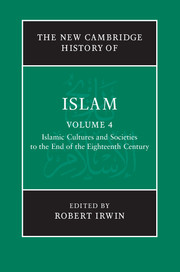Book contents
- Frontmatter
- Introduction
- PART I RELIGION AND LAW
- PART II SOCIETIES, POLITICS AND ECONOMICS
- PART III LITERATURE
- 13 Arabic literature
- 14 Persian literature
- 15 Turkish literature
- 16 Urdu literature
- 17 History writing
- 18 Biographical literature
- 19 Muslim accounts of the dār al-ḥarb
- PART IV LEARNING, ARTS AND CULTURE
- Glossary
- Bibliography
- Index
- References
16 - Urdu literature
from PART III - LITERATURE
Published online by Cambridge University Press: 28 March 2011
- Frontmatter
- Introduction
- PART I RELIGION AND LAW
- PART II SOCIETIES, POLITICS AND ECONOMICS
- PART III LITERATURE
- 13 Arabic literature
- 14 Persian literature
- 15 Turkish literature
- 16 Urdu literature
- 17 History writing
- 18 Biographical literature
- 19 Muslim accounts of the dār al-ḥarb
- PART IV LEARNING, ARTS AND CULTURE
- Glossary
- Bibliography
- Index
- References
Summary
In 1111/1700 there came to Delhi a man whose takhalluṣ (pen name) was Walῑ; his real name is a matter of dispute. Walῑ was born in 1075/1665 or 1077/1667, and almost certainly died in 1119–20/1707–8. The first account of his advent in Delhi is from the tadhkira (biographical dictionary of poets) Nikāt al-shuʿarāʾ (Finer points concerning the poets, c. 1165/1752) by Muḥammad Taqῑ Mῑr (1135–1225/1723–1810), the second from Makhzan-i nikāt (c. 1169/1756), another tadhkira, by Qāʾim Chāndpūrῑ (1137–1209/1724f.–95). This is what they say about Walῑ:
[Walῑ] is from Aurangābād. It is said that he came to Delhi too and presented himself before Miyān Shāh Gulshan and recited [before him] some verses of his own. Miyān Ṣāḥib observed, ‘There are all those Persian themes lying unused; bring them into use in your own Rēkhta; who is there to challenge you if you do this?’
In the forty-fourth regnal year of King ʿĀlamgῑr, he [Walῑ] came to Jahānābād, accompanied by … Abu al-Maʿālῑ … He used occasionally to compose a verse in Persian, praising Abu al-Maʿālῑ’s beauty. On arrival here [in Delhi], when he had the auspicious occasion to present himself before H. ad. rat Shaykh Saqd al-Lah Gulshan, may his grave be hallowed, he commanded him to compose poetry in Re¯khta, and by way of education, gave away to him the following opening verse that he composed:
Were I to set down on paper
The praises of the beloved’s beauty,
I would spontaneously
Convert the paper into the White Hand
Of Moses.
- Type
- Chapter
- Information
- The New Cambridge History of Islam , pp. 434 - 443Publisher: Cambridge University PressPrint publication year: 2010

